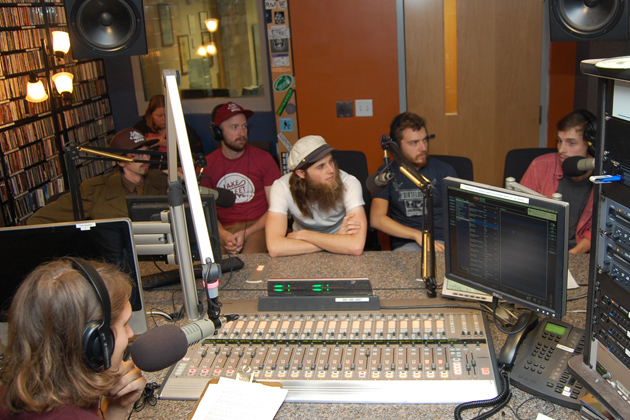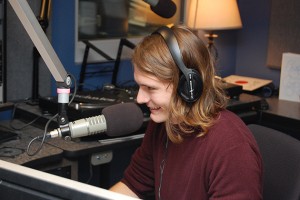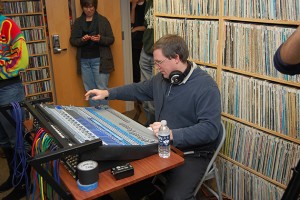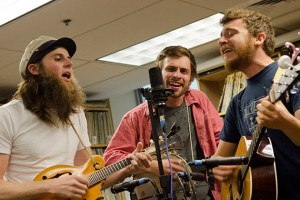
Radio stations are exploring new ways to maintain and expand their listening audiences in the face of digital downloads, satellite broadcasting, and applications that carry music and news to mobile devices.
WHUS (91.7 FM), UConn’s student station, has recently reshaped its programming schedule and added new content as part of its effort to maintain and expand its on-campus and local community audiences.

“We’re facing challenges from other media devices that are more instantaneous, like podcasting and streaming services, such as Pandora,” says Ryan Caron King ’15 (CLAS), a journalism student who is general manager of WHUS.
Like most college stations that feature a programming gumbo of music genres throughout the day based on the availability of volunteer student and community program hosts, listening to WHUS could be an adventure. Within just a few hours, the station might air classic rock, folk, jazz, blues, local news, or sports talk.
Last fall, the student-led Operations Board of WHUS decided to reorganize its programming generally in a “block scheduling” format that provides more consistency throughout the listening day by grouping similar genres of music and news-information shows during specific hours of the day.
“We have two listening bases: our community outside of the campus and our campus,” says King. “It came down to that we wanted to free up drive time for our massive commuter audience of students, faculty, and staff. We also thought that our public affairs programs would work around the mid-day. Most of that content can be found online anyway.”

Generally rock and world music now airs overnight until mid-morning, followed by news and talk until early afternoon, and electronic music and indie/pop sounds through late afternoon. From 7 p.m., specialty programs such as jazz, heavy metal, or audio theater can be heard until 10 p.m., when hip-hop rules until the early hours. The weekend brings the usual mix of specialty, folk, bluegrass, roots music, and other varied programming that often is hosted by long-time community volunteers.
WHUS is also growing its web presence. “Our core audience has to be the undergraduates of the University of Connecticut,” says Jason McMullan, programming coordinator at WHUS. “Every student has access to the Internet and is on the Internet more than they’re off it. We need to move into the mediums that the student population is accessing. We need to go where they are and we can bring everything that’s exciting about radio to this other place.”
The station is expanding its partnerships with other campus organizations by providing time for public service announcements for their events, as well as the previews of arts and cultural programming on campus that air regularly. In addition, the UConn Co-op is highlighting new book offerings each day in a five-minute review that airs during the public affairs block, and The Daily Campus is producing a program about local campus issues.

One of the newest program initiatives at WHUS began last fall with the debut of “New Spins,” a weekday program dedicated to playing new music releases, ticket giveaways, and a live performance segment called “The Studio Sessions Series.” Among the local musicians who have performed as part of the series are Poor Old Shine, Little Ugly, Funky Dawgz, Isaiah Writer and Roddy Legend, Sea Wolf, and Hanging Hills. Upcoming performers include Violent Mae on March 7, the UConn Jazz Band on March 14, Breakthrough Frequencies on March 17, and Slander on March 21.
“We intend for [New Spins] to offer something students can’t find in podcasts or other radio stations,” says King. “It’s hyper-local material and a device for music exploration.”
Such programs also provide new learning opportunities for students, such as studio engineering and recording for those not interested in hosting a show on the air, McMullan says.
“WHUS is a teaching station and one of our main roles is to offer everyone who comes through the door the opportunity to find their own voice in broadcasting,” he says. “We still have a lot of people coming in who just want to play music, but we have to be more than that if we’re going to maintain relevance.”
WHUS also has a developing news department. Adds McMullan, “We want to build that and offer it as a track for people interested in media and straight news reporting.”
WHUS is conducting its annual “Radiothon,” from Feb. 22 through March 7, which assists in providing funds to continue its expansion of programming and equipment replacement. For more information go to www.whus.org.


